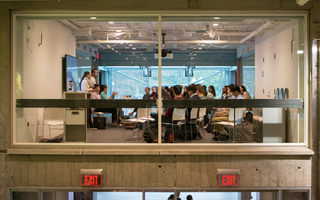{shortcode-292f9bf04a58e0c2a106c8a197d2cebe440bb91e}
The College’s Committee on Student Life is considering an audit of “comp” processes — membership training or vetting exercises for student organizations — to eliminate requirements which some committee members believe are “detrimental to campus culture,” according to several attendees of the Feb. 14 committee meeting.
Concerns voiced among members of the committee follow previous debate within the Undergraduate Council about the merits of comps and the requirements some organizations establish for prospective members. In 2016, the UC’s Finance Committee passed legislation tying funding to whether a club’s comp is “legitimate” and meets an “inclusivity standard.”
UC President Sruthi Palaniappan ’20 said she and UC Vice President Julia M. Huesa ’20 proposed that the committee consider the topic because they are concerned about the equity of students’ access to “exclusive” extracurricular opportunities. Many undergraduate organizations require some kind of comp, which can take the form of an application, audition, demonstration of proficiency, interview, or required meetings.
“Harvard is already an exclusive place, and the comp process adds a whole new layer of exclusivity,” Palaniappan said in an interview Monday. “So what are steps we can take to reduce the presence of overly competitive comps that have been difficult for students to navigate and detrimental to the overall campus culture?”
Palaniappan said she believes other problems with comps include intense time commitments, limited transparency about requirements, and a “social component” that students may find “arbitrary” and discouraging.
“The comp process for several organizations skews towards those students who already have experience in a particular area,” she said. “So it can be difficult for a student without any experience to have the same opportunity to partake in something new.”
Katie Colleran, senior director of student organizations and resources in the Dean of Students Office, wrote in an emailed statement that the proposed audit would aim to increase access to extracurricular opportunities.
“We are hoping to look at the bigger picture of why organizations comp and how those processes contribute to their recruitment and community,” she wrote. “One of the benefits of Harvard is the plethora of opportunities available both inside and outside of the classroom.”
Huesa said in an interview Monday that the first stage of the committee’s review will focus on understanding the underlying philosophy of organizations’ requirements. She said that based on the findings of the audit, the committee may then impose regulations on comp processes.
“I think… the next step would be putting in some type of regulation or some sort of stipulation for when clubs are applying for recognition — that they either wouldn't have comp processes or that their comp processes would take a certain form such that they would in some way be adding value or contributing to the experience or the educational mission of the College,” she said.
The long-term goal is to create standardized criteria for assessing comp processes to ensure that they are inclusive and reasonable, according to Palaniappan. She added that the committee will likely not implement any policy until the next academic year, taking this semester to learn more about comp processes for different groups.
“I think the immediate next steps would still be discussing with student organization leaders, and also trying to find more ways to collect feedback from students,” Palaniappan said. “Even once we develop the criteria, I do think that it will be a time-intensive, long process. I definitely know that it’s not something we can rush into, so it won’t happen within this semester.”
—Staff writer Sanjana L. Narayanan can be reached at sanjana.narayanan@thecrimson.com.
—Staff writer Samuel W. Zwickel can be reached at samuel.zwickel@thecrimson.com. Follow him on Twitter @samuel_zwickel.
















